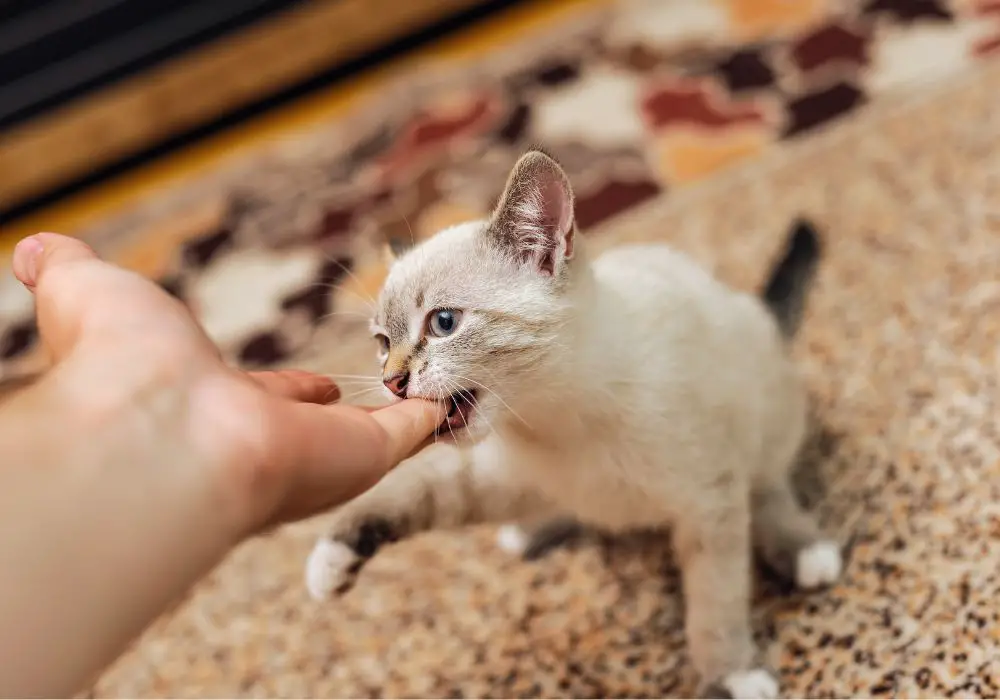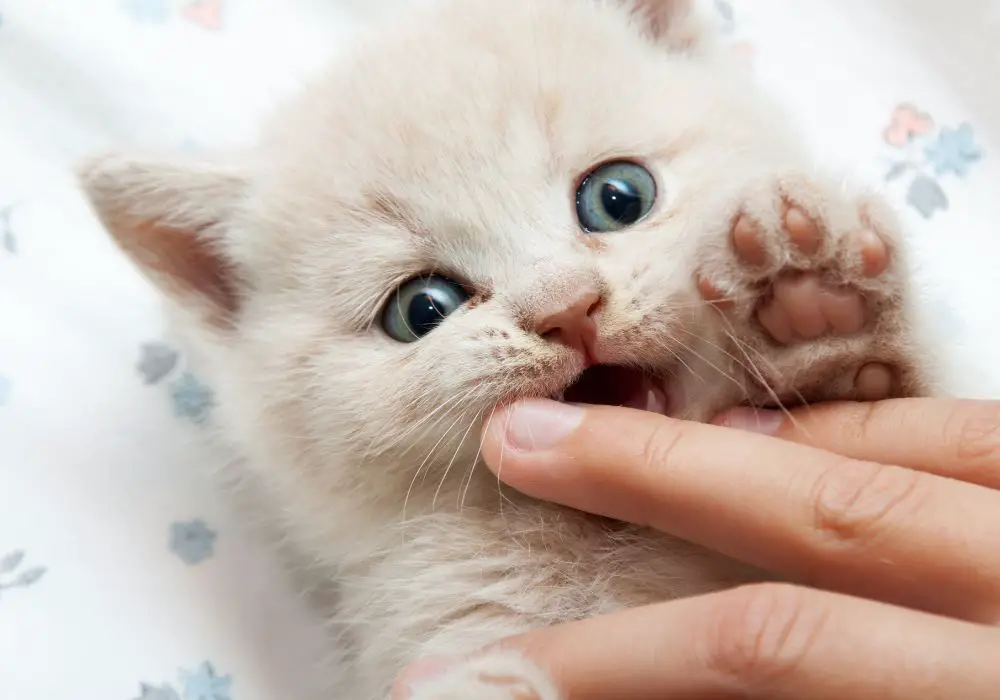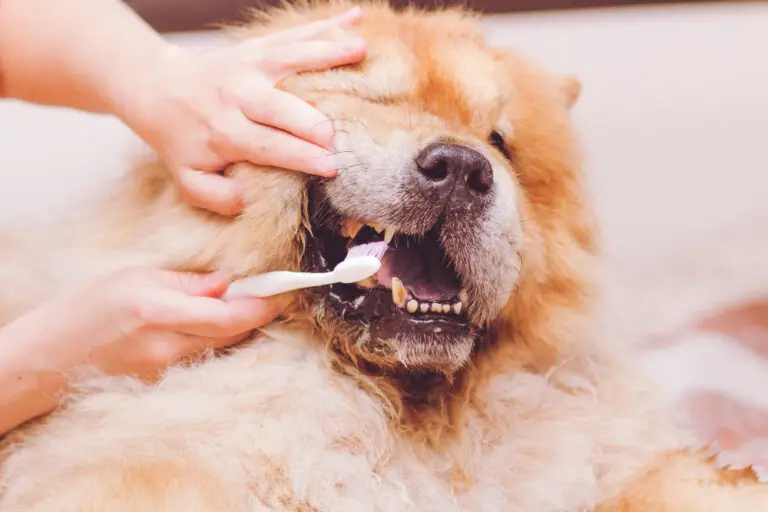If you’re a new kitten owner, you may be wondering if it’s normal for your kitten to bite more than usual. One possible explanation for this behavior is teething. Just like human babies, kittens go through a teething process where their baby teeth fall out and their adult teeth grow in. This can be a painful and uncomfortable process for kittens, which may lead to increased biting and chewing.
During teething, kittens may experience tenderness and soreness in their gums, which can cause discomfort. To alleviate this discomfort, kittens may bite and chew on objects, including their owner’s hands and fingers. While this behavior can be frustrating and painful for owners, it’s important to understand that it’s a natural part of the teething process.
Understanding Kitten Teething
If you’re a new kitten owner, you may be wondering why your little furball is biting everything in sight. Well, the answer is quite simple: teething. Just like human babies, kittens go through a teething process where their baby teeth fall out and are replaced by their adult teeth. In this section, we’ll go over the teething timeline and signs to look out for.
Teething Timeline
Kittens start teething at around 3-4 weeks old, and the process can last up to 6 months. During this time, their baby teeth will fall out and be replaced by their adult teeth. Here’s a breakdown of the teething timeline:
| Age | Teeth |
|---|---|
| 3-4 weeks | Incisors and primary canines |
| 3-4 months | Premolars |
| 4-6 months | Molars |
Signs of Teething
As your kitten’s teeth start to come in, they may exhibit some signs of discomfort. Here are some common signs of teething to look out for:
- Pawing at the mouth
- Drooling
- Chewing on objects
- Irritability
- Loss of appetite
It’s important to note that while some discomfort is normal during teething, excessive pain or bleeding should be evaluated by a veterinarian.
To help ease your kitten’s discomfort during teething, you can provide them with appropriate chew toys and treats. Avoid giving them hard objects that could damage their teeth, and always supervise them during playtime. With a little patience and care, your kitten will make it through the teething process and have a healthy set of adult teeth.
Why Kittens Bite When Teething

If you have a kitten, you may have noticed that they tend to bite more when they are teething. This is because, like human babies, teething kittens experience discomfort and pain in their mouths as their adult teeth grow in and their baby teeth fall out.
During this time, kittens may chew and bite on anything they can find, including your fingers, toes, and furniture. This behavior is a natural way for them to relieve the pain and discomfort they are feeling.
It’s important to note that while biting may be a natural behavior for teething kittens, it can still be painful and even dangerous for humans. Therefore, it’s essential to redirect your kitten’s biting behavior to appropriate objects, such as chew toys.
In addition to biting, you may also notice other signs that your kitten is teething, such as decreased appetite, pawing at their mouth, and red gums with slight bleeding. If you notice any of these signs, it’s important to provide your kitten with wet or softened food to help ease their discomfort while eating.
Overall, it’s important to be patient and understanding during this time. Remember that your kitten is going through a natural process, and with the right care and attention, they will soon have a full set of healthy adult teeth.
How to Soothe Teething Kittens
If you have a teething kitten, you may be wondering how to help them feel more comfortable during this time. Here are some tips to soothe your kitten’s teething discomfort.
Safe Chew Toys
Chew toys can help your kitten relieve their teething pain. When choosing a chew toy, make sure it is safe for your kitten to use. Here are some safe options:
- Kitten-specific chew toys: These toys are designed to be gentle on your kitten’s teeth and gums.
- Soft rubber toys: Soft rubber toys are a good option because they are gentle on your kitten’s teeth and can be easily chewed.
- Frozen toys: You can freeze some chew toys, such as rubber toys, to provide extra relief for your kitten’s sore gums.
Teething Treatments
There are some treatments you can use to help soothe your kitten’s teething discomfort. Here are some options:
- Wet food: Wet food can be easier for your kitten to eat than dry food, which can be harder on their sore gums.
- Cold water: You can offer your kitten cold water to drink, which can help soothe their sore gums.
- Massage: Gently massaging your kitten’s gums with a clean finger can help relieve their teething pain.
Remember to always supervise your kitten when they are using chew toys or eating, and consult with your veterinarian if you have any concerns about your kitten’s teething. By providing your kitten with safe chew toys and teething treatments, you can help them feel more comfortable during this time.
Preventing Biting During Teething

If you recently adopted a kitten, you may have noticed that your little furball loves to bite. This is because kittens go through a teething phase, just like human babies. During this time, their baby teeth fall out, and their adult teeth grow in. Unfortunately, this can be a painful and uncomfortable process for your kitten, which can lead to biting. Here are some tips to prevent biting during teething.
Training Techniques
Training your kitten not to bite is essential. Here are some techniques that you can use to train your kitten:
- Positive Reinforcement: Reward your kitten for good behavior. Whenever your kitten plays without biting, give them a treat or praise them.
- Redirecting: Whenever your kitten bites, redirect their attention to a toy or a scratching post. This will help them understand that biting is not acceptable, but playing with toys is.
- Discouraging Bad Behavior: Whenever your kitten bites, say “no” in a firm voice. This will help your kitten understand that biting is not acceptable.
Providing Distractions
Providing your kitten with distractions can also help prevent biting. Here are some distractions that you can use:
- Chew Toys: Provide your kitten with chew toys to help alleviate the pain and discomfort of teething. Make sure the toys are appropriate for your kitten’s age and size.
- Scratching Posts: Provide your kitten with a scratching post to help them exercise their claws. This will also help redirect their biting behavior.
- Interactive Toys: Provide your kitten with interactive toys, such as balls and feather wands. This will help keep them entertained and distracted from biting.
By using these techniques and providing distractions, you can help prevent your kitten from biting during their teething phase. Remember to be patient and consistent with your training, and always reward good behavior.
When to Consult a Vet
If your kitten’s teething seems to be causing excessive pain or discomfort, it’s important to consult with a veterinarian. Below are some signs that may indicate that your kitten needs medical attention:
- Refusal to eat or drink
- Excessive drooling
- Swollen or bleeding gums
- Loss of appetite
- Lethargy or weakness
- Persistent crying or whining
If you notice any of these symptoms, it’s important to schedule an appointment with your vet as soon as possible. Your vet can examine your kitten’s teeth and gums to determine if there are any underlying issues that need to be addressed.
In some cases, your vet may recommend pain relief medication or other treatments to help ease your kitten’s discomfort. They may also recommend changes to your kitten’s diet or provide suggestions for toys or other items that can help alleviate teething pain.
Remember, teething is a normal part of a kitten’s development, but it’s important to monitor your kitten’s symptoms and seek medical attention if necessary. With proper care and attention, your kitten can make it through this stage of development with minimal discomfort.
Frequently Asked Questions
How can I stop my kitten from biting and attacking me?
Kittens love to play and explore, but sometimes their play can turn into biting and attacking. To stop your kitten from biting, you can try redirecting their attention to a toy or scratching post. You can also try gently saying “no” and stopping playtime when they start biting. It’s important to never hit or physically punish your kitten, as it can cause fear and aggression.
What are some symptoms of kitten teething?
During the teething process, your kitten’s gums may be swollen and they may drool more than usual. You may also notice your kitten pawing at their mouth or chewing on objects more frequently. Keep an eye out for any signs of discomfort or pain, such as decreased appetite or lethargy.
How long does kitten teething last?
Kitten teething typically starts at around 3-4 months of age and can last up to 6 months. During this time, your kitten will be losing their baby teeth and growing their adult teeth.
At what age do kittens bite the most?
Kittens may bite more frequently during their teething phase, which usually occurs around 3-4 months of age. However, biting can also be a common behavior for kittens as they play and explore their environment.
Why is my kitten biting more than usual?
Kittens may bite more than usual for a variety of reasons, including boredom, anxiety, or lack of proper playtime. It’s important to provide your kitten with plenty of toys, scratching posts, and interactive playtime to prevent excessive biting.
What should I do if my kitten is chewing on everything?
If your kitten is chewing on objects around your home, try providing them with appropriate chew toys and scratching posts. You can also try spraying objects with a bitter taste deterrent to discourage chewing. It’s important to never punish your kitten for chewing, as it’s a natural behavior during the teething process.






